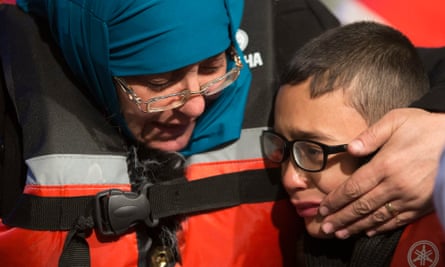Wet clothes are spread out on bushes and stones. Some people have lit fires. The torn heap of a grey rubber boat lies folded up on the coast.
Outside the abandoned concrete shells of a holiday village originally built for German tourists in the 1980s, Yasin and his friends nervously await the arrival of their smuggler. Here, near the upmarket Turkish coastal town of Çeşme, hundreds of refugees brave the icy winds of early December to make their way to the Greek island of Chios, less than two miles off the Turkish coast.
“We tried to cross this morning, but the boat hit some rocks and was torn,” said Yasin, 28, a Kurd from Iran who claims he had to leave his country for political reasons. All 45 passengers managed to get back safely to the Turkish shore, but most of them threw all their belongings overboard when the dinghy took in water.
The smuggler, an Afghan, has promised to come back with a new boat. Some of Yasin’s friends worry about possible arrest, or that he will not turn up as promised. Recent police crackdowns on refugees leave many in fear of getting stuck in Turkey.
In what is thought to be the largest such mass arrest of refugees in recent months, almost 3,000 future asylum seekers, mainly from Syria and Iraq, were picked up at the start of this month by Turkish police from the north-western town of Ayvacık, from where many leave for the Greek island of Lesbos. Police told local media that 35 suspected smugglers had also been detained, and hundreds of rubber dinghies seized.
The crackdown followed a highly controversial deal struck at a summit in Brussels, under which the EU pledged €3bn (£2.2bn) and political concessions to Turkey in exchange for increased border patrols. But while the Ayvacık sweeps suggest a clampdown on trafficking and irregular border crossings, refugees wanting to leave Turkey to claim asylum in Europe find themselves stuck in an increasingly hopeless limbo.
Turkish authorities say all the Syrian refugees detained last week have since been released, while others remain in detention in overcrowded, so-called return centres, facing deportation to their home countries, where they are often at risk of serious human rights abuses. Groups such as Amnesty International have warned that such expulsions violated the “non-refoulement” principle of international law, which bans countries from returning refugees to conflict zones where their lives may be in danger.
Local security forces are often overstretched. In Çeşme alone, 55 miles (90km) of ragged coastline make it hard to police the hidden bays and beaches. At an evening checkpoint, a senior police officer expresses his frustration at the lack of capacity for dealing with the refugee crisis.
“We don’t know where to put them. We want them to leave [to Greece]. There are hundreds of them here. We are unable to deal with such numbers in a meaningful manner,” he says. “And those we get off the beach always come back.”
A local journalist who wished to remain anonymous said police often turned a blind eye to the refugees who arrive in Çeşme.
“Everyone knows they are there, and where they are going. Sometimes they round them up, but they then have to let them go again. Until they actually leave Turkey illegally, they have not committed any offence,” the journalist said. “And both the police and the coastguard lack the proper facilities to process hundreds of people. Both they and the refugees are left in a very difficult situation.”

Last week security forces supported by police officers from Izmir detained more than 150 refugees. Several traffickers were arrested. But most of those picked up by the police were released several hours later. Some were put in taxis with orders to drive them back to Izmir.
“The taxi driver had a good heart and only drove us to the bus station [in Çeşme], and from there we walked back here,” says Mohammed Nour, 35, an Afghan national who worked as a translator for German troops in a Nato base in Kunduz for over five years. “There is nothing for us in Turkey. I cannot find work. Back home I received continuous death threats for my work with the Germans. We have used all our money to get here.”
Turkey, a country that hosts about 2.2 million Syrian refugees, the largest such population in the world, bars most asylum seekers and migrants from working. According to a recent report by the Turkish Confederation of Employer Associations (TISK), 400,000 Syrians, more than half of them children, are working illegally in Turkey, mostly without insurance and for salaries below the already meagre minimum wage.
Occasional sweeps of the beaches will not deliver a sustainable solution, says Ali Güray Yalvaçlı, head of the Imece Initiative Çeşme, a group of volunteers who supply food, clothes and other necessities to the refugees stuck outside the town.
“If the Germans and other Europeans want refugees to stay here, why don’t they open a few factories here, so that people can make a living and have a future here? Nobody wants to live in a camp, idly, without a future.”
But such solutions are lacking. Instead, the district governor has asked the Çeşme bus company not to take refugees on board, and taxi drivers are banned from driving them to the relevant drop-off points, under threat of having their licence revoked for 60 days. Local activists warn that such bans will only prompt smugglers and refugees to choose other, more dangerous ways, to reach the coast.
“If something is banned from being done in the open, it will go to the black markets. Whereas people could pay 10 [Turkish] lira to get on a public bus before, they will now have to pay 100 lira to travel in the back of a smugglers’ lorry. It will not stop people who are desperate trying to get away,” Yalvaçlı said.
Ali, 28, a lecturer of English from Idlib, says he and at least 20 others were stacked “like fish” in a closed van on their way from Izmir to Çeşme. From there he made his way to Chios. A second dinghy capsized that night, drowning at least three people. The perilous crossing was his third attempt to leave Turkey after having been arrested while trying to go to Lesbos and being illegally deported back to Turkey by Greek police at the land border with Edirne.
Ali worked in five different jobs in Turkey over the course of a year. He applied to countless schools, to no avail.
“I like Turkey, but life there is difficult. It’s a life without a future, without even an identity for us Syrians. Sometimes I woke up at night and had to remind myself who I am,” he said. “Sometimes I call the traffickers my heroes. They saved my life. It is only because of them that I am here, not because of the EU or the UN.”
Now he sits in a bus station among hundreds of other refugees waiting for the ferry that will take them from Chios to Athens. Senior local Greek police sources say they have not recorded any change in the numbers of arrivals after the agreement between Turkey and the EU was struck in Brussels.
In a way, Ali was lucky. For many others the random crackdowns by Turkish security forces mean they are stuck in limbo.
“They took our boat twice,” said Mushtaq, 27, who served two years in the Afghan army before death threats by the Taliban forced him to flee. Now he is stuck in the holiday village in Çiftlik. “I have no money left. The police took our boats twice, but didn’t arrest us, didn’t give us food. They also told us we could not make a fire on the beach.”
Fear of Turkey shutting its borders once and for all, as requested by the EU, has prompted many, including Ali, to bring forward their journey despite a significant drop in temperature and dangerously rough seas. According to the UN high commissioner for refugees, 30,451 asylum seekers made their way from Turkey to Greece at the beginning of December, 15 times as many as in all of December last year. Of at least 31 people who drowned in the Aegean this week alone, 11 were children.
Local activists are outraged at the EU deal, and many worry Turkey will use the money provided by the EU for security and more detention centres.
“Europe outsourced its border security to Turkey,” said Eda Bekçi, a lawyer who volunteers at the refugee aid group Mülteci-Der in Izmir. “But heightened security will push people-smuggling only deeper underground. They will always find holes, but the routes will become riskier and deadlier for refugees.”

Comments (…)
Sign in or create your Guardian account to join the discussion